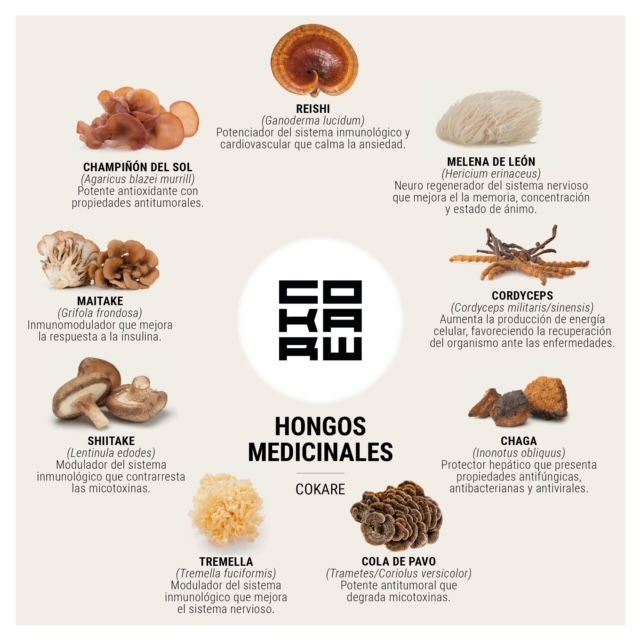BY: Carlos Capdepón
Essential guide to adaptogenic mushrooms
The adaptogenic mushrooms are those that help the body to adapt to environmental changes and stress, balancing the metabolism and improving physical and mental endurance. They are a group of mushrooms beneficial to our body and do not act in a unique sense, but help in the direction necessary to restore our balance. Neither have contraindications, nor maximum dosage.

Just as there are fungi that are harmful to health, so that a quarter of the world's food is contaminated by mycotoxins[1], there are also adaptogenic mushrooms such as Shiitake (Lentinula edodes), or Turkey Tail[2] (Coriolus/Trametes Versicolor), with enzymes that deactivate them[3] counteracting their toxicity.
The best known adaptogenic mushrooms are:
The growing interest in mushrooms is due, on the one hand, to the vegan/vegetarian movement, which has rescued mushrooms as another valuable non-animal food; and, on the other hand, organic farming has given mushrooms back their importance in production, since crops with the presence of non-pathogenic mushrooms allow greater absorption of water and nutrient distribution from soils, as well as protection against pathogens.
They help in the direction needed to restore our balance
It is crucial that mushrooms are grown ecologically[4] in their natural environment, controlling cross-contamination by air and rain. Mushrooms, as natural recyclers of organic and inorganic matter, absorb everything around them, including radioactive toxins and man-made toxins, which can be passed on to us when consumed. There are those who claim to solve this by producing in sterile industrial warehouses, which results in lower micronutrient density and product quality. It is best if they have European organic certification.
Each mushroom is considered either as a food or as a food supplement, which results in different obligations, labeling, marketing, etc. and greater confusion for the neophyte consumer. The quality of the product lies not only in its certified organic production, but also in its further processing. Dried and powdered mycelium is the lowest quality product with the lowest concentration. The products made from the fruiting body or mushroom, have a higher concentration and, if they also undergo a process of double extraction of water-soluble and fat-soluble compounds, their concentration is several times higher, being the products of higher quality and density of bioavailable compounds.
And finally mention that we have specific sensory receptors to the characteristic taste of mushrooms: the "umami" or "tasty". We still have a lot to discover about the benefits of mushrooms[5].
Fuentes:
Article published in Bio Eco Actual.What are Adaptogen Mushrooms? BioEco Actual nº119 january 2024, page. 24